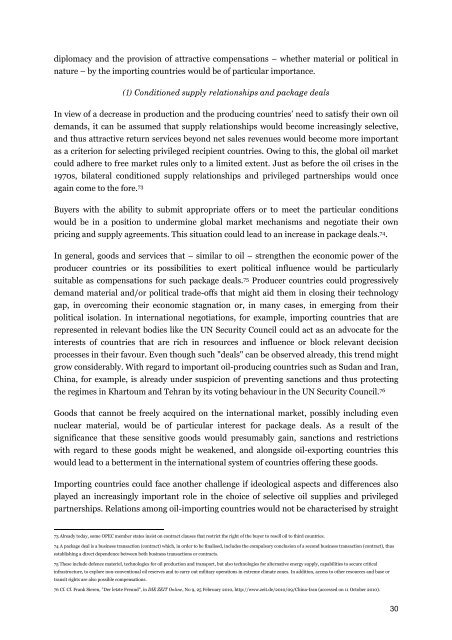PEAK OIL
PEAK OIL
PEAK OIL
Create successful ePaper yourself
Turn your PDF publications into a flip-book with our unique Google optimized e-Paper software.
diplomacy and the provision of attractive compensations – whether material or political in<br />
nature – by the importing countries would be of particular importance.<br />
(1) Conditioned supply relationships and package deals<br />
In view of a decrease in production and the producing countries’ need to satisfy their own oil<br />
demands, it can be assumed that supply relationships would become increasingly selective,<br />
and thus attractive return services beyond net sales revenues would become more important<br />
as a criterion for selecting privileged recipient countries. Owing to this, the global oil market<br />
could adhere to free market rules only to a limited extent. Just as before the oil crises in the<br />
1970s, bilateral conditioned supply relationships and privileged partnerships would once<br />
again come to the fore. 73<br />
Buyers with the ability to submit appropriate offers or to meet the particular conditions<br />
would be in a position to undermine global market mechanisms and negotiate their own<br />
pricing and supply agreements. This situation could lead to an increase in package deals. 74 .<br />
In general, goods and services that – similar to oil – strengthen the economic power of the<br />
producer countries or its possibilities to exert political influence would be particularly<br />
suitable as compensations for such package deals. 75 Producer countries could progressively<br />
demand material and/or political trade-offs that might aid them in closing their technology<br />
gap, in overcoming their economic stagnation or, in many cases, in emerging from their<br />
political isolation. In international negotiations, for example, importing countries that are<br />
represented in relevant bodies like the UN Security Council could act as an advocate for the<br />
interests of countries that are rich in resources and influence or block relevant decision<br />
processes in their favour. Even though such "deals" can be observed already, this trend might<br />
grow considerably. With regard to important oil-producing countries such as Sudan and Iran,<br />
China, for example, is already under suspicion of preventing sanctions and thus protecting<br />
the regimes in Khartoum and Tehran by its voting behaviour in the UN Security Council. 76<br />
Goods that cannot be freely acquired on the international market, possibly including even<br />
nuclear material, would be of particular interest for package deals. As a result of the<br />
significance that these sensitive goods would presumably gain, sanctions and restrictions<br />
with regard to these goods might be weakened, and alongside oil-exporting countries this<br />
would lead to a betterment in the international system of countries offering these goods.<br />
Importing countries could face another challenge if ideological aspects and differences also<br />
played an increasingly important role in the choice of selective oil supplies and privileged<br />
partnerships. Relations among oil-importing countries would not be characterised by straight<br />
73 Already today, some OPEC member states insist on contract clauses that restrict the right of the buyer to resell oil to third countries.<br />
74 A package deal is a business transaction (contract) which, in order to be finalised, includes the compulsory conclusion of a second business transaction (contract), thus<br />
establishing a direct dependence between both business transactions or contracts.<br />
75 These include defence materiel, technologies for oil production and transport, but also technologies for alternative energy supply, capabilities to secure critical<br />
infrastructure, to explore non-conventional oil reserves and to carry out military operations in extreme climate zones. In addition, access to other resources and base or<br />
transit rights are also possible compensations.<br />
76 Cf. Cf. Frank Sieren, "Der letzte Freund", in DIE ZEIT Online, No 9, 25 February 2010, http://www.zeit.de/2010/09/China-Iran (accessed on 11 October 2010).<br />
30


